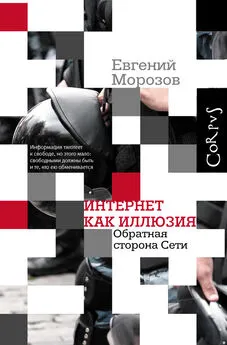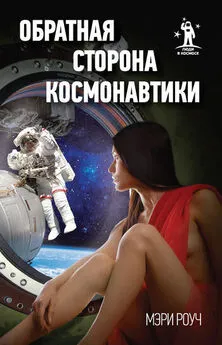Евгений Морозов - Интернет как иллюзия. Обратная сторона сети
- Название:Интернет как иллюзия. Обратная сторона сети
- Автор:
- Жанр:
- Издательство:Array Литагент «Corpus»
- Год:2014
- Город:Москва
- ISBN:978-5-17-084792-1
- Рейтинг:
- Избранное:Добавить в избранное
-
Отзывы:
-
Ваша оценка:
Евгений Морозов - Интернет как иллюзия. Обратная сторона сети краткое содержание
Интернет как иллюзия. Обратная сторона сети - читать онлайн бесплатно полную версию (весь текст целиком)
Интервал:
Закладка:
Hutchins, B., and L. Lester Environmental Protest and Tap-Dancing with the Media in the Information Age // Media, Culture & Society 28, no. 3 (2006): 433.
Huyke, H. J. Technologies and the Devaluation of What Is Near // Tech-né: The Journal of the Society for Philosophy and Techno logy 6, no. 3 (2003): 1–17.
Ingham, A. G., Graves, J., and V. Peckham The Ringelmann Effect: Studies of Group Size and Group Performance // Journal of Experimental Social Psychology 10, no. 4 (1974): 371–384.
Jayson, Sharon Are Social Networks Making Students More Narcis-sistic? // USA Today, August 25, 2009.
Kierkegaard, SØren Either/Or: A Fragment of Life . New York: Penguin Books, 1992.
Kierkegaard, SØren Fear and Trembling . New York: Cambridge University Press, 2006.
Klar, M., and T. Kasser Some Benefits of Being an Activist: Mea-suring Activism and Its Role in Psychological Well-Being // Political Psychology 30, no. 5 (2009): 755–777.
Levine, John M., and Richard L. Moreland, eds. Small
Groups: Key Readings . New York: Psychology Press, 2006. Lombaard, C. Fleetingness and Media-ted Existence: From Kierkegaard on the Newspaper to Broderick on the Internet // Communication 35, no. 1 (2009): 17–29.
Lupia, A., and G. Sin Which Public Goods Are Endangered? How Evolving Communication Technologies Affect the Logic of Collective Action // Public Choice 117, no. 3 (2003): 315–331.
Lysenko, V. V., and K. C. Desouza Cyberprotest in Contemporary Russia: The Cases of Ingushetiya.ru and Bakhmina.ru // Techno-logical Forecasting and Social Change 77, no. 7 (September 2010).
Martin, B., and W. Varney Nonviolence and Communication // Journal of Peace Research 40, no. 2 (2003): 213.
Mazzoleni, G., and W. Schulz “Mediatization” of Politics: A Challenge for Democracy? // Political Communication 16, no. 3 (1999): 247–261.
McCarthy, Caroline Facebook, Google, Others Sponsor Youth Activism Summit // CNET News, November 18, 2008. news.cnet. com/8301-13577_3-10101653-36.html.
Moqadam, Afsaneh “Death to the Dictator!” A Young Man Casts a Vote in Iran’s 2009 Election and Pays a Devastating Price . New York: Farrar, Straus and Giroux, 2010.
Morozov, Evgeny From Slacktivism to Activism // Net Effect, Fo-reign Policy, September 5, 2009. neteffect.foreignpolicy.com/posts/ 2009/09/05/from_slacktivism_to_activism.
Morozov, Evgeny It Feels Like Activism // Newsweek International, June 29, 2009.
Nielsen, Rasmus Kleis The Labors of Internet-Assisted Activism: Overcommunication, Miscommunication, and Communicative Overload // Journal of Information Technology & Politics 6, no. 3 (July 2009): 267–280.
Oliver, P. E. Formal Models of Collective Action // Annual Review of Sociology 19, no. 1 (1993): 271–300.
Olson, Mancur The Logic of Collective Action: Public Goods and the Theory of Groups // Harvard Economic Studies, vol. 124. Cambridge, MA: Harvard University Press, 1971.
Piezon, S. L., and R. L. Donaldson Online Groups and Social Loafing: Understanding Student-Group Interactions // Online Jour-nal of Distance Learning Administration 8, no. 4 (2005).
Rev, Istvan Just Noise? Paper presented at the Conference on Cold War Broadcasting Impact , Hoover Institution, Stanford University, Stanford, California, October 13–15, 2004.
Rutkowski, A. F., Vogel, D., Genuchten, M. van, and
C. Saunders Communication in Virtual Teams: Ten Years of
Experience in Education // IEEE Transactions on Professional Communication 3 (2008): 302–312.
Ryan, Alan Exaggerated Hopes and Baseless Fears // Social Research 64, no. 3 (Fall 1997).
Scola, Nancy The Next Diplomatic Cable // American Prospect, July 27, 2009.
Secretary Rice Remarks with U. K. Foreign Secretary David Miliband and Google Senior Vice President David Drummond . U. S. Department of State, May 22, 2008.
Shah, D. V., Cho, J., Eveland, W. P., et al. Information and Expression in a Digital Age: Modeling Internet Effects on Civic Participation // Communication Research 32, no. 5 (2005): 531.
Shapiro, Samantha M. Revolution, Facebook-Style: Can Social Networking Turn Young Egyptians into a Force for Democratic Change? // New York Times Magazine, January 22, 2009.
Shaw, Gillian Social Media Don’t Promote Significant Social Change, Author Says // Vancouver Sun, April 9, 2010.
Shirky, Clay Here Comes Everybody: The Power of Organizing Without Organizations . New York: Penguin Books, 2009.
Shiue, Y. C., Chiu, C. M., and C. C. Chang Exploring and Mitigating Social Loafing in Online Communities // Computers in Human Behavior (2010).
Skitka, L. J., and E. G. Sargis The Internet as Psychological Laboratory // Annual Review of Psychology 57 (2006): 529.
Slee, Tom Digital Activism: If Information Is Not the Problem, Information Is Not the Solution // Whimsley, January 10, 2010. whimsley.typepad.com/whimsley/2010/01/digital-activism-if-information-is-not-the-problem-information-is-not-the-solution. html.
Starobin, Paul In New Media, Image Is Still Everything // National Journal Magazine, September 12, 2009.
Stolle, D., Hooghe, M., and M. Micheletti Politics in the Supermarket: Political Consumerism as a Form of Political Participation // International Political Science Review/ Revue internationale de science politique 26, no. 3 (2005): 245.
Stone, Brad Users of Social Networks Use Posts to Support Charity // New York Times, November 11, 2009.
Suleiman, J., and R. T. Watson Social Loafing in Technology-Supported Teams // Computer Supported Cooperative Work 17, no. 4 (2008): 291–309.
Tajfel, H., Billig, M. G., Bundy, R. P., and C. Flament Social Categorization and Intergroup Behaviour // European Journal of Social Psychology 1, no. 2 (1971): 149–178.
Tripathi, A. K. On the Internet: Thinking in Action // Information Technology & People 15, no. 4 (2002): 136.
Twenge, Jean M., and W. Keith Campbell The Narcissism Epidemic: Living in the Age of Entitlement . New York: Simon & Schuster, 2009.
U. S. Official Discusses Alliance of Youth Movements Summit .
U. S. Department of State, December 1, 2008.
Undersecretary Glassman and Jared Cohen Hold a News Briefing on the Alliance for Youth Movements Summit at Columbia University at the Foreign Press Center, as Released by the State Department . Political Transcript Wire, November 24, 2008.
van Dick, R., Tissington, P. A., and G. Hertel Do Many Hands Make Light Work? // European Business Review 21, no. 3 (2009): 233–245.
Voelpel, S. C., Eckhoff, R. A., and J. Forster David Against Goliath? Group Size and Bystander Effects in Virtual Knowledge Sharing // Human Relations 61, no. 2 (2008): 271.
Wagner, J. A., III. Studies of Individualism-Collectivism: Effects on Cooperation in Groups // Academy of Management Journal 38, no. 1 (1995): 152–172.
Williams, K. D. Social Loafing on Difficult Tasks: Working Collectively Can Improve Performance // Journal of Personality and Social Psychology 49, no. 4 (1985): 937–942.
Williams, K. D., Harkins, S., and B. LatanÉ Identifiability as a Deterrent to Social Loafing: Two Cheering Experiments // Journal of Personality and Social Psychology 40, no. 2 (1981): 303–311.
Witte, E. H. Köhler Rediscovered: The Anti-Ringelmann Effect //
European Journal of Social Psychology 19, no. 2 (1989): 147–154. Worth, Robert F. Opposition in Iran Meets a Crossroads on Stra-tegy // New York Times, February 14, 2010.
Глава 8. Открытые сети, ограниченные умыAbidin Besleney, Zeynel Circassian Nationalism and the Inter-net // open-Democracy, May 21, 2010. www.opendemocracy.net/od-russia/zeynel-abidin-besleney/circassian-nationalism-and-internet.
Arrington, Michael Ok You Luddites, Time to Chill Out on Face-book over Privacy // TechCrunch, January 12, 2010. techcrunch. com/2010/01/12/ok-you-luddites-time-to-chill-on-facebook-over-privacy/.
Arrington, Michael Reputation Is Dead: It’s Time to Overlook Our Indiscretions // TechCrunch, March 28, 2010. techcrunch. com/2010/03/28/reputation-is-dead-its-time-to-overlook-our-indiscretions/.
Baker, L. The Unintended Consequences of US Export Restrictions on Software and Online Services for American Foreign Policy and Human Rights // Harvard Journal of Law & Technology 23, no. 2 (2010).
Barber, B. R. The Ambiguous Effects of Digital Technology on De-mocracy in a Globalizing World / In: Innovations for an E-Society: Challenges for Technology Assessment , ed. by Banse, G., Grun-wald, A., and M. Rader, 43–56. Berlin: Edition Sigma, 2002.
Bartow, A. A Portrait of the Internet as a Young Man // Michigan Law Review 108, no. 6 (2010).
Barlow, John Perry Leaving the Physical World // EFF.org, 1993. w2.eff.org/Misc/Publications/John_Perry_Barlow/HTML/leaving_the_physical_world.html.
Baumgartner, J. C., and J. S. Morris MyFaceTube Politics: Social Networking Web Sites and Political Engagement of Young Adults // Social Science Computer Review 28, no. 1 (2010): 24.
Beniger, J. R. Personalization of Mass Media and the Growth of Pseu-do-Community // Communication Research 14, no. 3 (1987): 352.
Billing, S. Saudi Campaign to Clean Up YouTube // ITP.net, August 13, 2009. www.itp.net/564689-its-just-boredom.
Bimber, Bruce Information and American Democracy: Technology in the Evolution of Political Power . New York: Cambridge University Press, 2003.
Boudreau, John Activists Aim to Punch Holes in Online Shields of Authoritarian Regimes // San Jose Mercury News, February 17, 2010.
Brenkert, G. G. Corporate Control of Information: Business and the Freedom of Expression // Business and Society Review 115, no. 1 (2010): 121–145.
Brenkert, G. G. Google, Human Rights, and Moral Compromise // Journal of Business Ethics 85, no. 4 (2009): 453–478.
Buchstein, H. Bytes That Bite: The Internet and Deliberative De-mocracy // Constellations 4, no. 2 (1997): 248–263.
Burrell, J. Problematic Empowerment: West African Internet Scams as Strategic Misrepresentation // Information Technologies and In-ternational Development 4, no. 4 (2008): 15–30.
Burton, Matthew On the Weaponization of the Collabora-tive Web . Personal Democracy Forum, June 16, 2009. personal-democracy.com/blog-entry/weaponization-collaborative-web.
Carr, M. Slouching Towards Dystopia: The New Military Futurism // Race & Class 51, no. 3 (2010): 13.
Carr, Nicholas Is Google Making Us Stupid? // Atlantic, August 2008.
Cavelty, M. D. Cyber-Terror – Looming Threat or Phantom Me-nace? The Framing of the US Cyber-Threat Debate // Journal of Information Technology & Politics 4, no. 1 (2007): 19–36.
Clarke, Richard A., and Robert Knake Cyber War: The Next Threat to National Security and What to Do About It . New York: HarperCollins, 2010.
Clinton, Hillary Remarks on Internet Freedom . The Newseum, Washington, DC, January 21, 2010.
Clinton, Hillary Speech to Kaiser Family Foundation . March 8, 2005. Cowie, James The Proxy Fight for Iranian Democracy // Renesys
Blog, June 22, 2009. www.renesys.com/blog/2009/06/the-proxy-fight-for-iranian-de.shtml.
Читать дальшеИнтервал:
Закладка:










